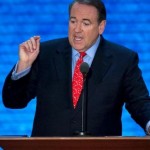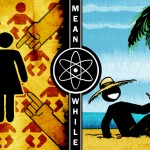Each Friday in Not Fit for Dinner, C. Ryan Knight explores political issues and the preconceptions guiding our understanding of and responses to them.
The debate over how important it is for candidates to be Christian has renewed this week upon Rick Santorum’s campaign suspension. Also, AnGeL Ministries’ director Anne Graham Lotz (the middle name gives her ministerial lineage away) was criticized for claiming on an MSNBC roundtable that she would “not vote for a man who was atheist.” As she mentioned earlier in the debate, she wants American presidents to have a “fear,” “respect,” and “reverence for God.”
The Blaze’s Billy Hallowell echoed Lotz’s concerns: “This distrust of atheists is widespread in society, as the vast majority of Americans claim that a belief in God is something they value in presidential candidates.” The debate host David Gregory referenced a poll indicating 86 percent of Americans think it’s important that presidential candidates believe in God. Interestingly, The Blaze’s own poll revealed (once I cast my vote) that the vast majority—88.35 percent—said they would vote for an atheist candidate.
There is, then, an obvious need to account for this wide disparity in polls, opinions, and polarized claims about the important of religion and faith to the American presidency.
It would be a dubious leap of faith—not to mention a revisionist reading of American history—for someone to claim all American presidents were or are Christians. Christopher Hitchens and others have explored Jefferson’s deism thoroughly. Abraham Lincoln is another president of questionable faith, whose beliefs sometimes seem primarily devoted to natural law.
Through their outspokenness and their vote, figureheads like Lotz are trying to prevent other potential imposters or professed disbelievers from entering the presidential “cloud of witnesses.” The interesting thing with the two presidents mentioned above is that both are key figures in American presidential history. If two men of tremulous faith in God were able to draft major and foundational documents of American history, we must admit that doubting and non-believing leaders can be used for profound good in the presidency.
To try, as Lotz and many evangelicals do, to support presidential candidates primarily based on their spiritual beliefs is a dangerous endeavor. As Gregory A. Boyd points out in his bestselling The Myth of a Christian Nation (2005), they risk attempting “moral guardianship”—a task in which Pharisees found illicit pleasure. The focus for believers, according to Boyd, should not be on how they vote but instead on how they conduct their lives.
I wonder if many fundamentalists are terrified of non-believing presidents largely because the election of such a figure would indicate that America is indeed post-Christian. Newsweek writers have explained that America’s being post-Christian does not mean that it accepts Nietzsche’s maxim that “God is dead” but rather that Christianity “is less of a force in American politics and culture than at any other time in recent memory.” Because such a president goes beyond their recent memory, they seem to think imminent, apocalyptic destruction is nigh.
All too often, religiously devout political leaders frequently get embroiled in compromising situations and make poor choices. God himself was resistant to the Israelites’ call for a king to rule them, and the Old Testament chronicles a series of political disasters beginning with Saul’s kingship. In more recent times, Former President George H. W. Bush, a professing believer, cannot shake off calls for him be tried for war crimes.
We should entertain the notion that non-religious leaders may very well be better situated for roles like kingship and the presidency. Paul assured believers all governing authorities are established by God, and believers should therefore submit themselves to the authorities’ rule (Romans 13.1-2). These words were addressed to believers living under one of the most powerful—and oftentimes brutal—political forces the world has ever seen. But not all unbelieving leaders are set on wielding similar oppressive power against their citizens. Perhaps the election of another unbelieving president would be the chance for renewal rather than the guaranteed restriction of religious rights.











